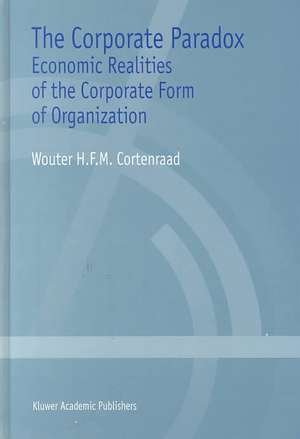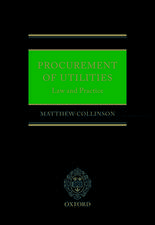The Corporate Paradox: Economic Realities of the Corporate Form of Organization
Autor Wouter H.F.M. Cortenraaden Limba Engleză Hardback – 29 noi 1999
Using modern economic theory concerning the functioning of markets and organizations, The Corporate Paradox examines how the concept of the corporation relates to the economic entity it organizes and in effect, how it may affect the use that firms make of society's valuable but scarce resources. To this end, both the economic rationales underlying the corporate form of organization and its effects on organizational and individual behavior are reviewed, with special emphasis on the separation between `ownership' and `control' and the principle of limited liability of shareholders, two features which are typical of the corporate concept. Finally, this book surveys, from a predominantly economic perspective, legal remedies that United States and Dutch law have developed in response to certain inefficiencies to which these features may give rise.
| Toate formatele și edițiile | Preț | Express |
|---|---|---|
| Paperback (1) | 1222.62 lei 6-8 săpt. | |
| Springer Us – 11 oct 2012 | 1222.62 lei 6-8 săpt. | |
| Hardback (1) | 1228.77 lei 6-8 săpt. | |
| Springer Us – 29 noi 1999 | 1228.77 lei 6-8 săpt. |
Preț: 1228.77 lei
Preț vechi: 1498.51 lei
-18% Nou
Puncte Express: 1843
Preț estimativ în valută:
235.19€ • 244.60$ • 197.09£
235.19€ • 244.60$ • 197.09£
Carte tipărită la comandă
Livrare economică 14-28 martie
Preluare comenzi: 021 569.72.76
Specificații
ISBN-13: 9780792386957
ISBN-10: 0792386957
Pagini: 402
Ilustrații: XI, 402 p.
Dimensiuni: 155 x 235 x 24 mm
Greutate: 0.76 kg
Ediția:2000
Editura: Springer Us
Colecția Springer
Locul publicării:New York, NY, United States
ISBN-10: 0792386957
Pagini: 402
Ilustrații: XI, 402 p.
Dimensiuni: 155 x 235 x 24 mm
Greutate: 0.76 kg
Ediția:2000
Editura: Springer Us
Colecția Springer
Locul publicării:New York, NY, United States
Public țintă
ResearchDescriere
The `corporation' is by far the most successful legal concept of organization among large business firms. Yet there are numerous examples of firms operated in corporate form that were troubled either by internal problems arising from divergences of interests between the firm's various constituents (notably, managers and investors), or by conflicts with other members of society (including both victims of accidents or environmental pollution caused by the firm and unpaid creditors in the event of business failure). It is this paradox between the corporation's prima facie success and its apparent ambiguity in other respects that is examined in this book.
Using modern economic theory concerning the functioning of markets and organizations, The Corporate Paradox examines how the concept of the corporation relates to the economic entity it organizes and in effect, how it may affect the use that firms make of society's valuable but scarce resources. To this end, both the economic rationales underlying the corporate form of organization and its effects on organizational and individual behavior are reviewed, with special emphasis on the separation between `ownership' and `control' and the principle of limited liability of shareholders, two features which are typical of the corporate concept. Finally, this book surveys, from a predominantly economic perspective, legal remedies that United States and Dutch law have developed in response to certain inefficiencies to which these features may give rise.
Using modern economic theory concerning the functioning of markets and organizations, The Corporate Paradox examines how the concept of the corporation relates to the economic entity it organizes and in effect, how it may affect the use that firms make of society's valuable but scarce resources. To this end, both the economic rationales underlying the corporate form of organization and its effects on organizational and individual behavior are reviewed, with special emphasis on the separation between `ownership' and `control' and the principle of limited liability of shareholders, two features which are typical of the corporate concept. Finally, this book surveys, from a predominantly economic perspective, legal remedies that United States and Dutch law have developed in response to certain inefficiencies to which these features may give rise.
Cuprins
Acknowledgments. Note on Citations. Introduction. Part I: The Corporate form of Organization. 1. On Buttermilk and Islands of Conscious Power. 2. The Corporate Vehicle - A View from Organization Theory. 3. A Paradox Named Limited Liability. Part II: The Corporate Dichotomy: Managers Versus Shareholders. 4. The Problem of Internal Costs. 5. The Quest for Remedies: Markets, Monitoring and Managerial Liability. 6. Disciplining the Unfaithful Agent - Legal Responses to the Internal Costs Problem. Part III: Limited Liability and Organizational Behavior. 7. The Problem of External Costs. 8. Extended Liability and Other Possible Remedies. 9. In Search of Souls to Damn - Legal Responses to the External Costs Problem. Concluding Remarks. References. Case Index. Subject Index.
Notă biografică
H.F.M. Cortenraad (1966), is a member of the bar of Amsterdam, The Netherlands. He is currently a practicing lawyer in the Amsterdam offices of Loeff Claeys Verbeke (Nederland), where he specializes in corporate law and commercial litigation. Cortenraad graduated from the law schools of the Universities of Maastricht, The Netherlands, and Toronto, Canada. He is a former legal counsel of the Royal Dutch/Shell Group and a former John M. Olin Visiting Research Fellow in Law and Economics at Harvard Law School, USA.

















